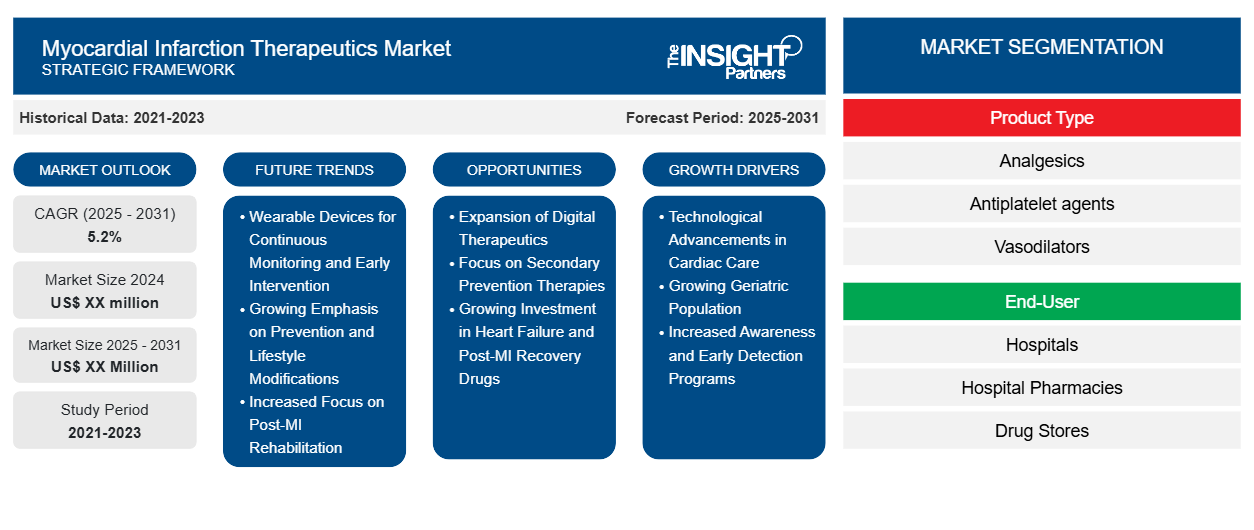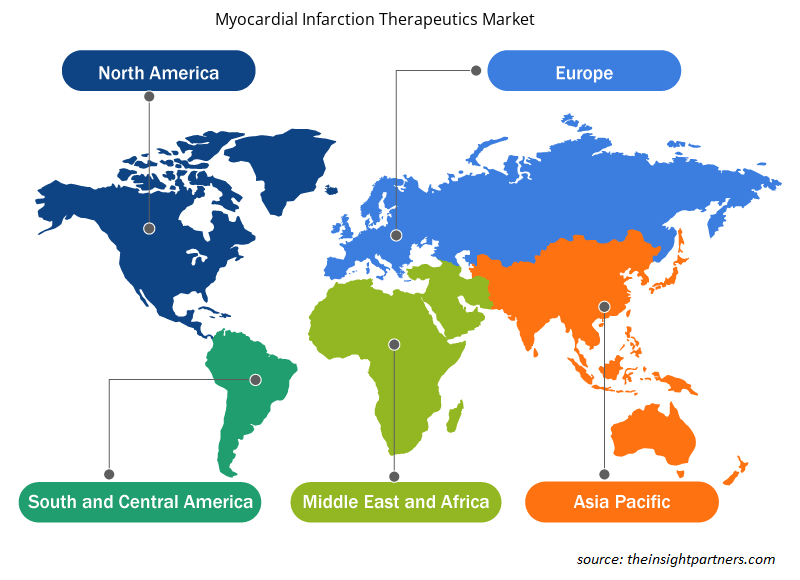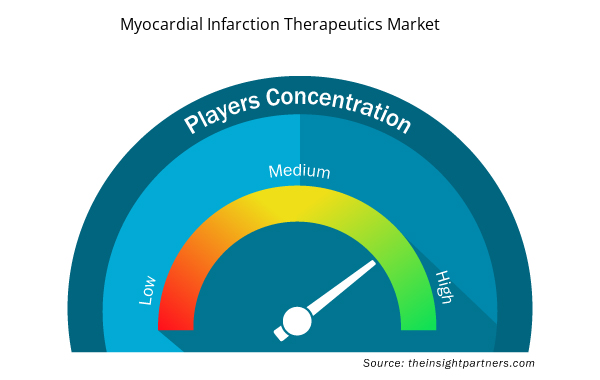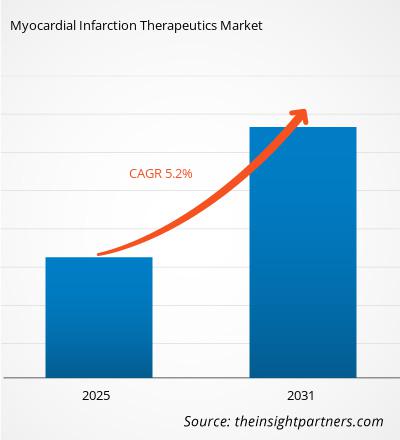The Myocardial Infarction Therapeutics Market is expected to register a CAGR of 5.2% from 2025 to 2031, with a market size expanding from US$ XX million in 2024 to US$ XX Million by 2031.
The Myocardial Infarction Therapeutics Market report covers segmental analysis by Product Type (Analgesics, Antiplatelet agents, Vasodilators, Thrombolytics and anti-thrombotic agents, Glycoprotein IIb/IIIa inhibitors); End-User (Hospitals, Hospital Pharmacies, Drug Stores, Online drug stores), and Geography (North America, Europe, Asia Pacific, and South and Central America). The global analysis is further broken down at the regional level and major countries. The report Offers the Value in US$ for the above analysis and segments.
Purpose of the Report
The report Myocardial Infarction Therapeutics Market by The Insight Partners aims to describe the present landscape and future growth, top driving factors, challenges, and opportunities. This will provide insights to various business stakeholders, such as:
- Technology Providers/Manufacturers: To understand the evolving market dynamics and know the potential growth opportunities, enabling them to make informed strategic decisions.
- Investors: To conduct a comprehensive trend analysis regarding the market growth rate, market financial projections, and opportunities that exist across the value chain.
- Regulatory bodies: To regulate policies and police activities in the market with the aim of minimizing abuse, preserving investor trust and confidence, and upholding the integrity and stability of the market.
Myocardial Infarction Therapeutics Market Segmentation
Product Type
- Analgesics
- Antiplatelet agents
- Vasodilators
- Thrombolytics and anti-thrombotic agents
- Glycoprotein IIb/IIIa inhibitors
End-User
- Hospitals
- Hospital Pharmacies
- Drug Stores
- Online drug stores
Customize This Report To Suit Your Requirement
You will get customization on any report - free of charge - including parts of this report, or country-level analysis, Excel Data pack, as well as avail great offers and discounts for start-ups & universities
Myocardial Infarction Therapeutics Market: Strategic Insights

- Get Top Key Market Trends of this report.This FREE sample will include data analysis, ranging from market trends to estimates and forecasts.
Myocardial Infarction Therapeutics Market Growth Drivers
- Technological Advancements in Cardiac Care: The integration of cutting-edge medical technologies into myocardial infarction management is enhancing the overall patient outcomes, thereby driving the market for therapeutics. Artificial Intelligence (AI), machine learning, and advanced diagnostic imaging techniques enable earlier and more accurate detection of MI, leading to more timely intervention and personalized treatments. As a result, patients receive tailored therapeutic regimens that improve recovery and reduce mortality rates, fueling demand for new and improved cardiovascular therapeutics.
- Growing Geriatric Population: As the global population ages, the number of older adults susceptible to myocardial infarction is increasing. The aging population is more prone to chronic conditions such as hypertension, diabetes, and high cholesterol, which are all risk factors for MI. This demographic shift is driving demand for specialized therapeutics and post-MI care solutions, boosting the Myocardial Infarction Therapeutics Market. Furthermore, aging individuals are often more likely to require long-term management, increasing the market for chronic treatment options.
- Increased Awareness and Early Detection Programs: Rising awareness among the public about the symptoms and risk factors of myocardial infarction, as well as the importance of early detection, is contributing to the growth of the therapeutics market. As more individuals seek regular check-ups and engage in preventive health measures, early intervention becomes more common, increasing the demand for preemptive and post-event therapeutics. The role of healthcare providers in educating the public about the risks of MI is fostering a more proactive approach to treatment, thus expanding market opportunities.
Myocardial Infarction Therapeutics Market Future Trends
- Wearable Devices for Continuous Monitoring and Early Intervention: The rise of wearable health technologies is expected to be a game-changer in the Myocardial Infarction Therapeutics Market. Wearables such as smartwatches, heart monitors, and sensors can continuously track key indicators like heart rate, blood pressure, and oxygen levels, providing real-time data that can alert both patients and healthcare providers to early signs of potential MI events. These devices, coupled with mobile health apps and AI, will enable continuous monitoring, allowing for timely therapeutic interventions and minimizing the risk of complications. The future will likely see more advanced wearables integrated with MI therapeutics, enhancing patient management and improving outcomes.
- Growing Emphasis on Prevention and Lifestyle Modifications: As awareness of the impact of preventative healthcare increases, the focus of the Myocardial Infarction Therapeutics Market will shift toward lifestyle modification interventions. Future trends will see a greater emphasis on combining pharmacological treatments with behavioral therapy, nutrition guidance, and fitness plans to prevent MI events. With more people adopting heart-healthy lifestyles, the demand for preventative MI therapeutics will rise. This trend will result in a more holistic approach to MI management, reducing the reliance on reactive treatments and focusing more on proactive health interventions.
- Increased Focus on Post-MI Rehabilitation: Future trends indicate a growing focus on post-MI rehabilitation as an integral part of the treatment process. Cardiac rehabilitation programs, which include physical therapy, psychological counseling, and nutritional advice, will be further integrated into the MI therapeutics ecosystem. By addressing both the physical and emotional aspects of recovery, these programs are expected to improve long-term survival rates and quality of life. The rising emphasis on comprehensive post-MI care will lead to the growth of new rehabilitative therapeutics, combining pharmaceuticals with lifestyle interventions to support holistic recovery.
Myocardial Infarction Therapeutics Market Opportunities
- Expansion of Digital Therapeutics: The growth of digital therapeutics presents a major opportunity within the Myocardial Infarction Therapeutics Market. Mobile apps, wearables, and remote monitoring systems are increasingly being integrated into cardiac care, enabling patients to track their heart health in real-time. These technologies not only empower patients to manage their own conditions but also improve adherence to medication regimens and treatment protocols. As the digital health market continues to grow, MI therapeutics will become more personalized, with tailored digital interventions designed to optimize outcomes. The opportunity lies in creating scalable, cost-effective digital solutions that complement traditional therapies.
- Focus on Secondary Prevention Therapies: There is a growing opportunity in the secondary prevention segment of the MI therapeutics market. Patients who survive an initial myocardial infarction are at an increased risk for subsequent heart events. Developing therapies that focus on secondary prevention—such as antithrombotic agents, beta-blockers, and angiotensin inhibitors—is crucial to reducing the risk of a second MI or stroke. With increased attention on the prevention of recurrent events, there is a large unmet need for long-term management options, providing significant growth opportunities for pharmaceutical companies specializing in chronic care therapeutics.
- Growing Investment in Heart Failure and Post-MI Recovery Drugs: As more people survive myocardial infarctions, the need for post-MI recovery drugs and heart failure therapies is increasing. MI patients are often at risk for heart failure, which can significantly impact quality of life and increase healthcare costs. The development of heart failure drugs, such as sodium-glucose cotransporter-2 (SGLT2) inhibitors and ARNI (angiotensin receptor-neprilysin inhibitors), presents a growing opportunity in the MI therapeutics market. Companies that can offer solutions that improve heart function and enhance recovery in post-MI patients will find a growing market, particularly as the number of elderly individuals with heart conditions rises.
Myocardial Infarction Therapeutics Market Regional Insights
The regional trends and factors influencing the Myocardial Infarction Therapeutics Market throughout the forecast period have been thoroughly explained by the analysts at Insight Partners. This section also discusses Myocardial Infarction Therapeutics Market segments and geography across North America, Europe, Asia Pacific, Middle East and Africa, and South and Central America.

- Get the Regional Specific Data for Myocardial Infarction Therapeutics Market
Myocardial Infarction Therapeutics Market Report Scope
| Report Attribute | Details |
|---|---|
| Market size in 2024 | US$ XX million |
| Market Size by 2031 | US$ XX Million |
| Global CAGR (2025 - 2031) | 5.2% |
| Historical Data | 2021-2023 |
| Forecast period | 2025-2031 |
| Segments Covered |
By Product Type
|
| Regions and Countries Covered | North America
|
| Market leaders and key company profiles |
Myocardial Infarction Therapeutics Market Players Density: Understanding Its Impact on Business Dynamics
The Myocardial Infarction Therapeutics Market market is growing rapidly, driven by increasing end-user demand due to factors such as evolving consumer preferences, technological advancements, and greater awareness of the product's benefits. As demand rises, businesses are expanding their offerings, innovating to meet consumer needs, and capitalizing on emerging trends, which further fuels market growth.
Market players density refers to the distribution of firms or companies operating within a particular market or industry. It indicates how many competitors (market players) are present in a given market space relative to its size or total market value.
Major Companies operating in the Myocardial Infarction Therapeutics Market are:
- AstraZeneca
- Bayer AG
- Bristol-Myers Squibb Company
- Eli Lilly and Company
- Pfizer Inc
- Daiichi Sankyo, Inc.
Disclaimer: The companies listed above are not ranked in any particular order.

- Get the Myocardial Infarction Therapeutics Market top key players overview
Key Selling Points
- Comprehensive Coverage: The report comprehensively covers the analysis of products, services, types, and end users of the Myocardial Infarction Therapeutics Market, providing a holistic landscape.
- Expert Analysis: The report is compiled based on the in-depth understanding of industry experts and analysts.
- Up-to-date Information: The report assures business relevance due to its coverage of recent information and data trends.
- Customization Options: This report can be customized to cater to specific client requirements and suit the business strategies aptly.
The research report on the Myocardial Infarction Therapeutics Market can, therefore, help spearhead the trail of decoding and understanding the industry scenario and growth prospects. Although there can be a few valid concerns, the overall benefits of this report tend to outweigh the disadvantages.
- Historical Analysis (2 Years), Base Year, Forecast (7 Years) with CAGR
- PEST and SWOT Analysis
- Market Size Value / Volume - Global, Regional, Country
- Industry and Competitive Landscape
- Excel Dataset


- Virtual Event Software Market
- Hot Melt Adhesives Market
- Power Bank Market
- Data Center Cooling Market
- Flexible Garden Hoses Market
- Equipment Rental Software Market
- Single Pair Ethernet Market
- Smart Water Metering Market
- Quantitative Structure-Activity Relationship (QSAR) Market
- Grant Management Software Market

Report Coverage
Revenue forecast, Company Analysis, Industry landscape, Growth factors, and Trends

Segment Covered
This text is related
to segments covered.

Regional Scope
North America, Europe, Asia Pacific, Middle East & Africa, South & Central America

Country Scope
This text is related
to country scope.
Frequently Asked Questions
The Myocardial Infarction Therapeutics Market is expected to register a CAGR of 5.2% from 2025-2031.
The major factors impacting the Myocardial Infarction Therapeutics Market are: Technological Advancements in Cardiac Care, Growing Geriatric Population and Increased Awareness and Early Detection Programs
Key future trends in this market are - Wearable Devices for Continuous Monitoring and Early Intervention, Growing Emphasis on Prevention and Lifestyle Modifications and Increased Focus on Post-MI Rehabilitation
Key companies of this market are: AstraZeneca, Bayer AG, Bristol-Myers Squibb Company, Eli Lilly and Company, Pfizer Inc, Daiichi Sankyo, Inc., Janssen Biotech, Inc., Novartis International AG, Sanofi, Par Pharmaceutical Companies
The report can be delivered in PDF/PPT format; we can also share excel dataset based on the request.
Some of the customization options available based on request are additional 3–5 company profiles and country-specific analysis of 3–5 countries of your choice. Customizations are to be requested/discussed before making final order confirmation, as our team would review the same and check the feasibility.
Trends and growth analysis reports related to Life Sciences : READ MORE..
1. AstraZeneca
2. Bayer AG
3. Bristol-Myers Squibb Company
4. Eli Lilly and Company
5. Pfizer Inc
6. Daiichi Sankyo, Inc.,
7. Janssen Biotech, Inc.,
8. Novartis International AG
9. Sanofi
10. Par Pharmaceutical Companies
11. Mylan NV
12. Boehringer Ingelheim GmbH
13. GlaxoSmithKline PLC
14. Portola Pharmaceuticals, Inc
15. Teva Pharmaceuticals Industries Ltd
16. BioVascular, Inc

 Get Free Sample For
Get Free Sample For